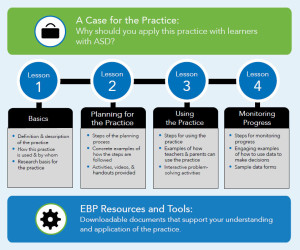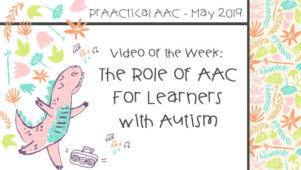October Site of the Month: The National Professional Development Center on ASD

October’s featured site is full of resources on empirically-supported instructional practices for students with autism spectrum disorders (ASD). The National Professional Development Center (NPDC) on ASD website was a collaborative effort by The University of North Carolina at Chapel Hill, the University of Wisconsin at Madison, and the MIND Institute, University of California-Davis which was funded by the US Department of Education. You may already be familiar with their work through their collaboration with the Ohio Center for Autism and Low Incidence (OCALI) in creating the Autism Internet Modules.
While there are various things to explore on the NDPC site, there are a few main resources that you won’t want to miss.
Practice Briefs
If you are looking for at-a-glance information on intervention practices and their research supports, this is a page you will want to bookmark. There are over two dozen practice briefs that summarize the literature in instructional practices such as social narratives, SGDs, and functional communication training. Each one has an overview of the key features of that practice, a summary for how it is implemented, an Implementation Checklist that we can use to ensure that we are implementing the practice with fidelity, and a summary of its evidence base.
You can see those practice briefs here.
Professional Development Modules
Due to the success of the NPDC project, it was extended to a second project that provides more information on these practices. The Autism Focused Intervention Resources & Modules (AFIRM) project has professional development modules that can be taken as part of a certificate track or just for your own information. There are several modules already available on topics that are helpful to AAC practitioners and other stakeholders, such as visual supports and the use of time delay, and more are being added all the time.

Each module has a consistent format that includes:
- Essential element of a specific EBP appropriate for individuals with ASD
- Explanations of the behaviors and skills that can be addressed using that EBP
- A clear, step-by-step implementation guide
- Downloadable resources, many of which can be customized
- Parent Guides
Please note that you must register for a free account in order to use the OCALI AIM or the AFIRM modules. Hope you enjoy exploring these wonderful resources!
Filed under: PrAACtical Thinking
Tagged With: ASD, Autism Internet Modules, NDPC ASD, Site of the Month
This post was written by Carole Zangari




